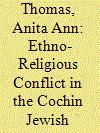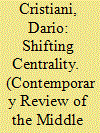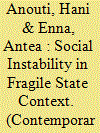|
|
|
Sort Order |
|
|
|
Items / Page
|
|
|
|
|
|
|
| Srl | Item |
| 1 |
ID:
193282


|
|
|
|
|
| Summary/Abstract |
The migration of Cochin Jews from Kerala to the promised land of Israel can be traced back to the 1950s. Though the population of the Jewish community in Cochin is reduced to less than ten in number today, their past cannot be erased from Kerala history, especially the ethnic life of the Malabari Jewish community. Apart from folk songs and archaeological findings, Ruby Daniel, a Malabari Jewish woman, and the renowned ethnographer Barbara C. Johnson left behind an essential source of ethnographic data to explore the social life of Jew town. The significant ethnic life of the Malabari Jewish community and their attempt to claim and confirm their identity as the mainstream Cochin Jewish community continues even today among the remaining Malabari Jews in the Jew town. This article attempts to analyze the ethnic and social life of the Malabari Jewish community and the Cochin Jewish community through the auto-ethnographical narrative of Ruby Daniel.
|
|
|
|
|
|
|
|
|
|
|
|
|
|
|
|
| 2 |
ID:
193278


|
|
|
|
|
| Summary/Abstract |
64–0! It should be an impressive vote in any country, especially in Israel, where a simple parliamentary majority has been elusive since the State was founded. This was not to be. The vote on July 24 marks the vertical social, political and, above all, ethical divide within Israel. Over 30 weeks of continuous protests proved ineffective. At least for now.
|
|
|
|
|
|
|
|
|
|
|
|
|
|
|
|
| 3 |
ID:
193281


|
|
|
|
|
| Summary/Abstract |
The article empirically analyzes the effects of residential status and social security on migrant workers’ remittance outflow, linking it with financial literacy concepts such as financial capability, financial advice, and financial anxiety. The study’s originality lies in its empirical examination of financial literacy constructs, residency, and social security using partial least squares structural equation modeling to examine data collected from a closed-ended questionnaire in the United Arab Emirates (UAE). The results provide significant insights for policymakers and service providers in a country with the second-largest outflow of remittances in the world and indicate that, except for financial advice, all other factors have a substantial impact on remittance activity.
|
|
|
|
|
|
|
|
|
|
|
|
|
|
|
|
| 4 |
ID:
193279


|
|
|
|
|
| Summary/Abstract |
This study seeks to understand what was behind the May 2021 violence of the Arab minority in Israel, particularly in mixed cities: was it national, religious or civic motives, or a combination of them? Historically, relations between Jews and non-Jews (mostly Muslims) in Israel circle around three axes: religious, national, and civic. While the fragile relations between the parties enjoy a quiet routine, a serious escalation is recorded from time-to-time, leading to a crisis between the parties. This was the case in May 2021, when an outbreak of severe Arab violence was recorded in mixed cities in Israel that resulted in three victims (two Jews, one Arab), dozens of injuries, and heavy damage to Jewish property. This qualitative research, based on interviews with Arab residents in mixed cities and media reports during the clashes and afterward, concludes that despite all three components having a significant contribution to May 2021 violent conflicts, civil affairs were the main reason for riots in mixed cities; however, the outbreak has a national and religious historical background.
|
|
|
|
|
|
|
|
|
|
|
|
|
|
|
|
| 5 |
ID:
193283


|
|
|
|
|
| Summary/Abstract |
This article examines the changing patterns in Türkiye’s strategic and military posture since the establishment of the Republic, with a focus on the developments, and changes, since the 1980s. Originally based on the two principles of deterrence and collective security, this view has later developed in other directions. In the 1980s, this posture started to shift as Türkiye became a more assertive regional player, and the domestic civilian–military balances were changing. This evolution would emerge more visibly under the AKP, as a new perception of the Turkish geographical centrality brought the country to play a pro-active regional and international role, exemplified by the emergence of Türkiye as a peacekeeping actor with an aggressive economic foreign policy. In this period, the Turkish strategic view evolved, making active engagement and forward defense two pillars of a new approach.
|
|
|
|
|
|
|
|
|
|
|
|
|
|
|
|
| 6 |
ID:
193280


|
|
|
|
|
| Summary/Abstract |
Lebanon has always been an unstable and challenging country. With or without refugees, politics in Lebanon is subject to different internal, regional, and international dynamics that affect the country’s fragile political, security, economic, and social stability. To better understand social instability in Lebanon, this article sheds light on the role of Syrian refugees in diminishing or otherwise of Lebanon’s political, security, and social stability. Taking into consideration the historical role of refugees—especially Syrians—in affecting social stability and the whole political system in an already fragile and almost failed state, the article will also rely on the existing literature on the relationships and interactions between host communities and refugees. This contribution will rely on a qualitative approach to explore the relations and drivers of tensions between Lebanese host communities and the Syrian refugees, highlighting the differences in perceptions and the main sources of strains. In particular, the article will investigate the policies and aid schemes of the international community, mainly United Nations organizations and international nongovernmental organizations, in fostering or otherwise of the tension between the Lebanese host community and the Syrian refugees.
|
|
|
|
|
|
|
|
|
|
|
|
|
|
|
|
|
|
|
|
|